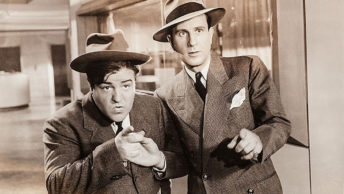One of Alfred Hitchcock’s best pictures was his 1953 film I Confess, the dramatic story of a parish priest accused of a murder. The plot was complicated by the fact that the real murderer confesses his heinous crime to a priest in the confessional. The scales of justice weight the priest’s life against the sanctity of the Seal of Confession. Hitchcock treats the priest’s conundrum with artistic style and grace that respected both the priest’s right to life and Church doctrine.
While the Hitchcock film was a box office success, American culture has so changed in 50 years that a cynical public would swiftly reject its priestly sympathies. Thoughts of confessing one’s sins or the Seal of Confession are foreign concepts to a secular society that does not accept sin or sinners. Hollywood’s traditional portrayal of the priesthood has all but disappeared from the big screen. The heavenly smiles of Barry Fitzgerald and Bing Crosby as parish priests have relinquished the spotlight to the sodden alcoholic and the child-molesting pervert.
Human beings will always need to unburden themselves from the pangs of conscience. Sins create guilt and guilt seeks a healing confession. Those who find the confessional repugnant now look for inner peace in other venues. Some bare their souls to the local bartender. Others choose the unfettered freedom of the psychiatrist’s couch over the solemn privacy of the confessional. In this modern confessional, validation and approval substitute for penance and forgiveness.
The Psychiatrist encourages the sinner to focus, not on the evil or harm of the patient’s behavior but on the subconscious causes and nurture issues that have prompted his actions. Psychiatry has inverted the natural cause of things so that patients think of themselves, more as victims rather than active agents of bad or evil behavior.
In his book, Peace of Soul, Bishop Fulton J. Sheen maintains that every sin seeks its release. If a sin does not come out in confession, it will manifest it in many other ways, often with harmful personal and social consequences. An unrepentant society is one which has lost its anchor in a cultural sea of death and despair.
The Catholic Church has always preached the dangers of falling into the spiritual traps, known as the Seven Deadly Sins. These sins, pride, covertness, lust, envy, anger, sloth and gluttony, are the linear descendants of original sin, which left man seriously flawed and susceptible to their deadly influences. A society that has rejected any notion of sin based on Revelation and has been weaned on moral relativism, tolerance, and non-judgmentalism is seriously unable to recognize the abject evil that spiritual vices produce.
Due to popular indifference, the Seven Deadly Sins have been relegated to the dusty archives where medieval notions are shelved. Instead of providing material for an examination of conscience, they have been reduced to advertisement fodder, such as in a recent commercial for a wireless company that makes an EnV phone.
Many sins are inherently evil. The leaders of the French Revolution, such as Jean Jacques Rousseau and the Philosophes, rebelled against the idea of evil. Since then Liberalism has dedicated itself to explaining away the idea of evil by attributing the apparent evils of life to the abnormalities in an individual’s upbringing or environment.
No individual did more to take sinners out of the confessional and put them on the couch than Sigmund Freud (1856-1939) the Father of Psychoanalysis. He believed that each personality was divided into the ego, id, and superego. Most babies start out on a purely subconscious level or the id. The ego or the rational side of the human personality develops from the id, enabling the child to negotiate realistically with the world around him. The superego or conscience evolves as the child learns the moral values of his society, often creating an interior conflict between values and desires. The ego mediates the selfish needs of the id and idealistic demands of the superego.
The adoption of an uncritical superego is dependent upon the child resolving the Oedipus Complex. This is the collection of unconscious wishes involving sexual desires, of a male child for his mother. The keys to understanding Freud’s twisted impact on American culture reside within this idea. He used the Oedipus Complex to justify his own aberrant sexual actions and impulses that emerged from his hostility toward his father Jacob and his strong affection for his mother Amalia. In his 40s he was plagued with several phobias and an obsession with dying. In 1896, not only did Freud’s father die but he also kicked his cocaine habit and begin an incestuous relationship with his sister-in-law, Minna Bernays.
According to E. Michael Jones’ 1993 book Degenerate Moderns, Freud made a complicated religion-sexual system that will not only provide explanation but the fulfillment of all his deeply held desires as well to appease his troubled conscience. He spent his life militating against the universal standards of sexual morality that would have condemned his illicit behavior. His Oedipus Complex exonerated him from his desire for Minna because his violation of nature’s oldest taboo had put him above nature, sin, and God as well. His psychological theory paved the way toward a universal pathology because he believed that even normal people are only borderline neurotics.
Not all of the turmoil that began in the 1960s can be laid at Freud’s doorstep. The main culprit in this destructive social transformation has been the Frankfurt School of Social Research, which paired Karl Marx with Freudian psychology. Cal State University psychology professor Kevin MacDonald has produced the best analysis of its parasitical relationship with American Society in his essay The Frankfurt School of Social Research and the Origin of the Therapeutic State, which appeared in the Spring 2006 edition of The Occidental Quarterly.
The Frankfurt School originated as the Institute of Social Research in the University of Frankfurt in Germany in the 1920s. Jewish millionaire Felix Weil, who was a noted patron of the left, founded the Institute. By the 1930s the University of Frankfurt had become a bastion of leftist thinking. With the election of Adolph Hitler in 1933 the Institute was branded a Communist organization and many of its members fled Germany for the United States. In America its leading proponents Theodor Adorno, Max Horkheimer, and Herbert Marcuse developed a culture of critique that would undermine the West in the manner theorized by Sardinian Communist Antonio Gramsci.
To the Marxists, the West was a citadel of oppression and domination that had to be destroyed. MacDonald concentrated on their plan to subvert the Western institutions, such as the family, religion, culture, and patriotism that stabilized American society. They planned a Balkanized model of a multi-cultural society where minority groups and their interests had a priori moral value, while cohesive groups are viewed as pathological and subject to radical criticism.
In his Escape from Freedom, cultural Marxist Erich Fromm argued that people sought refuge in fascist movements because they were afraid of the responsibilities of freedom and choice. The religions and racial solidarity of the majority frustrated this public will. The same rules never applied to minorities who were always considered above and beyond the need for rules and regulations.
Herbert Marcuse was another notable member of the Frankfurt School who spent many years teaching in the United States. In his Eros and Civilization, written in 1974, he promoted Freud’s theory that Western culture produces pathology because it represses sexual urges. This results in perpetual unfreedom and suffering.
No American institution better represented this unfreedom than the family. Igor Shafarevich identified the family as the central target of the cultural Marxist in his 1975 essay, Socialism in our Past and Future. The Marxists took advantage of the fact that the traditional family rests on sexual restraint and the nurturing of children. The Frankfurt School realized that anything that disrupted family harmony worked in their favor.
Both Max Horkheimer and Theodor Adorno put the traditional family under the microscope of their Critical Theory. In his Eclipse of Reason, Horkheimer contended that all modern ills, including Nazism, collectivism, mental illness, and criminality are due to the oppressive nature of family life. Their goal was to deconstruct the family until its strength and vitality had evaporated. The linchpin to family stability was the father. Weaken the mother and the sons will turn into bad husbands and fathers. Devalue fatherhood and the family will likely tumble.
Taking a leaf from Rousseau’s Emile, Horkheimer reasoned that from birth a child naturally resents the domineering aspects of civilization, especially from submitting to the autocratic will of the father. Constant parental discipline took its toll over the course of a child’s life. The child who did not rebel against the father’s tyranny was mentally ill. Those who valued high moral standards, long-term marriages, and practiced chastity, were all considered mentally ill. Obedient children become conformists, who will march to the drumbeat of demagogues such as Adolph Hitler. The Catholic Church had the same negative affect on a spiritual level, using fear and intimidation for control.
Adorno went even further in his book, The Authoritarian Personality. The book promoted the idea that Westerners who identified with family, nation, or race suffered from a psychiatric disorder. The psychological traits instilled by an autocratic father, according to Adorno, invariably lead to anti-Semitism, racism, and homophobia, the great pathologies of the 21st century. Many of the pathologies of the 1960s counterculture revolution found their expression in Adorno’s book, including parental rebellion, illicit sexual behavior and scorn for upward social mobility, Christianity and patriotism.
The disciples of the Frankfurt School dedicated their energies to weeding out the loyal remnants to the traditional institutions of family, nation, and religion, so as to create the vacuum for a Marxist state. In their ideal world the United States would become a therapeutic state a national infirmary of souls. The Marxist rhetoric of the Frankfurt School had established its beachhead after the war in the public school system through the writings of John Dewey and his progressive education. With the exclusion of religious-based instruction from the public schools, millions of children lost their best defense against the moral intrusion of government and civil organizations like HEW, Planned Parenthood, and the ACLU.
According to Marxist rhetoric, all murders, rapists, prostitutes and thieves were sick or just misunderstood. The jargon of the psychiatrist’s office had replaced that of the criminal code. The liberal principles of the French Revolution have melded with the Freudian subconscious, to create a non-judgmental and tolerant public whose first impulse was to ascribe, even the most heinous crime, to the agent’s poor upbringing, alienation from his peers and inability to communicate his darkest fears. The criminal is in a word, sick, in need of, not revenge-oriented punishment, but therapeutic counseling. To them criminality and immorality were maladjustments to be cured by education.
In just over a generation, America went from a nation of individual families to a multicultural tribe of conflicting groups. The solidarity of the group had replaced the natural family. The country was now a loosely assorted mosaic of warring lobby groups and cultural identity partisans.
All personal problems were transformed into psychological problems, to be treated with counseling and/or pharmaceuticals. Before the country had realized what had happened, it was a Prozac Nation, whose first impulse was not the confessional but the medicine cabinet for the alleviation of its feelings of guilt and Angst. Librium, Ritalin, and Prozac became the drugs of choice, devastating the American family as it vainly tried to keeping up with the Joneses in material, social and academic success.
The modern society that has emerged from the 50 years of Marxist influence in American schools and in many churches is antithetical to the basic tenets of Christianity. In an August issue of Chronicles Magazine, French professor Claude Polin describes this state of mankind as living in a state of unhappiness and wretchness. He emphasizes that it is not God’s fault but man’s. These serious social problems are the result of the original sin that the modern world denies. It was not God who made man unhappy but his sinfulness. This is in perfect accord with Bishop Sheen’s Peace of Soul.
To alleviate the human condition God sent His only Son to redeem the world and raise man back to its original status before the fall. Jesus not only opened the Gates of Heaven but also provided man with the grace and a plan for his salvation. Christ’s revolutionary outlook on life truly changed the way people had lived at that time. Jesus taught a revolution of the soul, which offered to throw out the old wineskin of the Mosaic Law and replace it with the new wineskin of agape.
To facilitate and perpetuate this revolution, Christ chose his successors on earth and established his Church on the Rock of St. Peter. The Church brought love and forgiveness where there had been none. It emphasized modesty and humility where people were lustful and proud and urged people to do good works and love their enemies. Men are unhappy because they have ignored the Church’s moral teachings on sin and become so attached to their temporal lives, as Polin suggests, beyond all reason that they have lost sight of the true meaning of life.
God could have made men so that they would never fall into sin but then there would not have been free will. All man has to do is avoid the sinful ailments that threaten to induce the nation into a coma of lust, greed, laziness and anger that will destroy him from within. This is not only good advice, it is also a prescription for happiness. Once the soul has completed its inner revolution, it will be immune to the material entrapments of the world, the flesh, and the devil. When this has been accomplished, all the Frankfurtian prescriptions of the modern world cannot infect the soul with a victomology that brings only emotional immaturity, spiritual death, and national suicide. Unfortunately the pendulum seems to be moving farther to the left.








